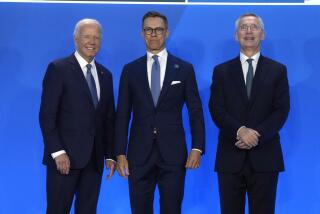U.S., West Germany Sign 2 Pacts on Role in ‘Star Wars’ Research
- Share via
WASHINGTON — The United States and West Germany reached agreement Thursday on the ground rules for German participation in “Star Wars” research, expanding the role of Western Europe in the space-based missile defense program, the Pentagon announced.
Several rounds of diplomatically difficult negotiations--complicated by doubts expressed by some members of the Bonn government about the wisdom of joining the program--were concluded with the signing of two accords by Defense Secretary Caspar W. Weinberger and West German Economics Minister Martin Bangemann.
A senior Pentagon official, summarizing the results of a concerted Reagan Administration effort to win support for the controversial research among other allies, predicted that overseas trips by Weinberger and Lt. Gen. James A. Abrahamson, the Air Force officer in charge of the program, would soon pay off in other such agreements.
“The Israelis are interested. We believe the Italians are,” he said, adding that Japanese officials have made several trips here to discuss joining the research effort. “I expect by this time next year there will be several countries involved.”
Last December, Britain became the first European nation to formally agree to take part in the multibillion-dollar Strategic Defense Initiative, as the “Star Wars” program is officially known. Five weeks ago, Abrahamson conducted a classified briefing for hundreds of British scientists interested in the prospect of obtaining contracts.
The Pentagon declined to make public details of the agreements reached with West Germany, but a senior official, speaking on the condition that he not be identified, said that a “memorandum of understanding” provides for the participation of the German government, research institutions and industry in the research, and covers use of developed technology for non-SDI programs.
Sensitive Technologies
He said that a second accord deals with protection of militarily sensitive technologies--an area of intense concern in Europe in general and, specifically in West Germany, where there is considerable commerce with Eastern Europe.
The official said that the Pentagon would seek to protect the confidentiality of the agreements because similar accords are being negotiated with other nations and disclosure of the details could complicate the talks.
He said he was unable to estimate what strategic defense contracts, negotiated as a result of the U.S-West Germany agreement, would be worth in terms of dollars.
More to Read
Sign up for Essential California
The most important California stories and recommendations in your inbox every morning.
You may occasionally receive promotional content from the Los Angeles Times.













